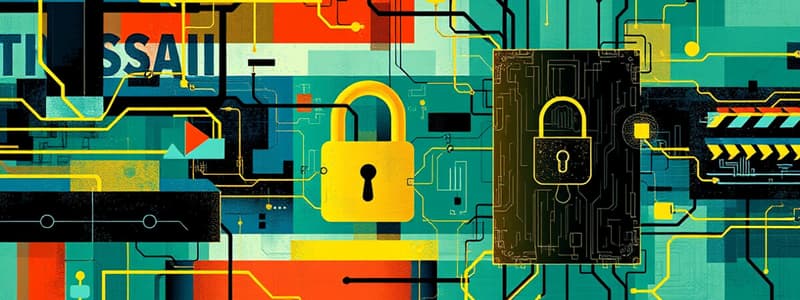Podcast
Questions and Answers
What is the primary purpose of auditing access logs in an access control system?
What is the primary purpose of auditing access logs in an access control system?
- To establish system performance benchmarks.
- To detect and respond to unauthorized access attempts. (correct)
- To grant access permissions to users.
- To enhance user interface design.
What is the Principle of Least Privilege primarily focused on?
What is the Principle of Least Privilege primarily focused on?
- Allowing users maximum access to resources
- Enforcing strict mandatory access controls
- Implementing complex access control models
- Granting users only necessary access for their job functions (correct)
Which challenge in access control is primarily related to the complexity of managing diverse environments?
Which challenge in access control is primarily related to the complexity of managing diverse environments?
- Regulatory Compliance
- Balancing Security and Usability
- Complex Environments (correct)
- Human Error
In Role-Based Access Control (RBAC), how is access determined?
In Role-Based Access Control (RBAC), how is access determined?
Which of the following access rights allows a user to view the contents of a file without modifying it?
Which of the following access rights allows a user to view the contents of a file without modifying it?
What distinguishes Role-Based Access Control (RBAC) from Discretionary Access Control (DAC)?
What distinguishes Role-Based Access Control (RBAC) from Discretionary Access Control (DAC)?
What type of access control allows users to set permissions for other users?
What type of access control allows users to set permissions for other users?
What does Authentication in access control systems primarily involve?
What does Authentication in access control systems primarily involve?
Which of the following access controls grants permissions based on user identity and is determined by the resource owner?
Which of the following access controls grants permissions based on user identity and is determined by the resource owner?
Which strategy is primarily aimed at preventing fraud or error in access management?
Which strategy is primarily aimed at preventing fraud or error in access management?
Which access control method is commonly used in military environments?
Which access control method is commonly used in military environments?
What is the primary purpose of authorization in access control?
What is the primary purpose of authorization in access control?
What is a significant challenge related to ensuring compliance with access rights?
What is a significant challenge related to ensuring compliance with access rights?
Which mechanism enhances security by requiring multiple forms of verification for access?
Which mechanism enhances security by requiring multiple forms of verification for access?
What is a common challenge when managing access control in large organizations?
What is a common challenge when managing access control in large organizations?
Which access control method allows for context-aware decisions based on user attributes?
Which access control method allows for context-aware decisions based on user attributes?
What is the purpose of Access Control Lists (ACLs) within an access control system?
What is the purpose of Access Control Lists (ACLs) within an access control system?
Which access control model does not allow users to alter their permissions?
Which access control model does not allow users to alter their permissions?
Which method is NOT typically used for Authentication in access control?
Which method is NOT typically used for Authentication in access control?
What role do Access Control Lists (ACLs) play in access control?
What role do Access Control Lists (ACLs) play in access control?
What is the purpose of Access Control Lists (ACLs)?
What is the purpose of Access Control Lists (ACLs)?
Which of the following best describes Role-Based Access Control (RBAC)?
Which of the following best describes Role-Based Access Control (RBAC)?
Attribute-Based Access Control (ABAC) grants access based on which criteria?
Attribute-Based Access Control (ABAC) grants access based on which criteria?
Which process must occur before authorization can take place?
Which process must occur before authorization can take place?
Which factor could lead to security vulnerabilities in access control systems due to mistakes made by administrators?
Which factor could lead to security vulnerabilities in access control systems due to mistakes made by administrators?
What does the term 'Permission Inheritance' refer to in access control?
What does the term 'Permission Inheritance' refer to in access control?
Which of the following is NOT considered a type of access right?
Which of the following is NOT considered a type of access right?
Which statement about discretionary access control is true?
Which statement about discretionary access control is true?
What does the Principle of Least Privilege entail?
What does the Principle of Least Privilege entail?
Which access control model relies on attributes for granting permissions?
Which access control model relies on attributes for granting permissions?
What is the primary focus of Separation of Duties in authorization principles?
What is the primary focus of Separation of Duties in authorization principles?
In which type of access control does the owner of the resource determine who has access?
In which type of access control does the owner of the resource determine who has access?
What is a characteristic of Context-Based Access Control?
What is a characteristic of Context-Based Access Control?
Which access control technique is best for ensuring compliance with security policies?
Which access control technique is best for ensuring compliance with security policies?
What kind of access control can restrict access based on time?
What kind of access control can restrict access based on time?
Which access control type utilizes strong authentication mechanisms combined with user identity?
Which access control type utilizes strong authentication mechanisms combined with user identity?
What is the main advantage of Role-Based Access Control (RBAC)?
What is the main advantage of Role-Based Access Control (RBAC)?
Which control model assigns permissions based on rules set by a central authority?
Which control model assigns permissions based on rules set by a central authority?
What is a potential problem with nodes knowing their potential clients in a distributed web authorization structure?
What is a potential problem with nodes knowing their potential clients in a distributed web authorization structure?
Which of the following is a disadvantage of using a security token as a possession-based authentication method?
Which of the following is a disadvantage of using a security token as a possession-based authentication method?
What does Attribute-Based Access Control (ABAC) primarily rely on for granting permissions?
What does Attribute-Based Access Control (ABAC) primarily rely on for granting permissions?
Which of the following is NOT a characteristic of Time-Based Restrictions?
Which of the following is NOT a characteristic of Time-Based Restrictions?
What is the main focus of authentication in cybersecurity?
What is the main focus of authentication in cybersecurity?
How does Context-Aware Access Control enhance access decisions?
How does Context-Aware Access Control enhance access decisions?
Which of the following is NOT a type of biometric authentication?
Which of the following is NOT a type of biometric authentication?
Which type of authorization provides the most precise control over access?
Which type of authorization provides the most precise control over access?
What should be avoided when configuring web servers to minimize security risks?
What should be avoided when configuring web servers to minimize security risks?
What is a primary disadvantage of Dynamic Authorization?
What is a primary disadvantage of Dynamic Authorization?
Which of the following describes Multi-Factor Authentication (MFA)?
Which of the following describes Multi-Factor Authentication (MFA)?
What is a disadvantage of knowledge-based authentication methods?
What is a disadvantage of knowledge-based authentication methods?
What does Data Minimization aim to achieve in access control?
What does Data Minimization aim to achieve in access control?
Which is an example of Fine-Grained Authorization?
Which is an example of Fine-Grained Authorization?
Which type of authentication involves analyzing user behavior, such as typing patterns?
Which type of authentication involves analyzing user behavior, such as typing patterns?
Why is it important to schedule periodic security scans by a trusted third party?
Why is it important to schedule periodic security scans by a trusted third party?
What is a key benefit of User Education and Awareness in security practices?
What is a key benefit of User Education and Awareness in security practices?
What does the acronym ACL stand for in the context of web authorization?
What does the acronym ACL stand for in the context of web authorization?
Which type of authorization is characterized by permissions defined by rules?
Which type of authorization is characterized by permissions defined by rules?
What is the primary challenge associated with managing Coarse-Grained Authorization?
What is the primary challenge associated with managing Coarse-Grained Authorization?
What is a significant advantage of multi-factor authentication (MFA)?
What is a significant advantage of multi-factor authentication (MFA)?
What is a primary advantage of using cryptographic challenge-response mechanisms in authentication?
What is a primary advantage of using cryptographic challenge-response mechanisms in authentication?
Which of the following elements is NOT typically required in multi-factor authentication?
Which of the following elements is NOT typically required in multi-factor authentication?
What is a potential disadvantage of behavioral authentication methods?
What is a potential disadvantage of behavioral authentication methods?
What challenge is often associated with the implementation of MFA?
What challenge is often associated with the implementation of MFA?
Which of the following is an example of contextual authentication?
Which of the following is an example of contextual authentication?
How does adaptive authentication enhance security?
How does adaptive authentication enhance security?
Which user behavior might be analyzed in behavioral authentication?
Which user behavior might be analyzed in behavioral authentication?
What is a potential vulnerability of SMS-based MFA?
What is a potential vulnerability of SMS-based MFA?
What is a disadvantage of implementing contextual authentication?
What is a disadvantage of implementing contextual authentication?
What is a recommended practice for implementing MFA effectively?
What is a recommended practice for implementing MFA effectively?
Which factor is considered a possession-based element in MFA?
Which factor is considered a possession-based element in MFA?
Which aspect does behavioral authentication improve compared to traditional methods?
Which aspect does behavioral authentication improve compared to traditional methods?
What aspect of user experience can be negatively affected by MFA?
What aspect of user experience can be negatively affected by MFA?
Which authentication method utilizes digital certificates for user verification?
Which authentication method utilizes digital certificates for user verification?
What should organizations ensure during account recovery processes in MFA?
What should organizations ensure during account recovery processes in MFA?
What is a disadvantage of using passwords as an authentication factor?
What is a disadvantage of using passwords as an authentication factor?
Which authentication method significantly enhances security by combining factors?
Which authentication method significantly enhances security by combining factors?
What is a feature of biometric scans used in authentication?
What is a feature of biometric scans used in authentication?
Which of these is a protocol used for centralized authentication?
Which of these is a protocol used for centralized authentication?
What is a potential drawback of Multi-Factor Authentication (MFA)?
What is a potential drawback of Multi-Factor Authentication (MFA)?
What do security tokens provide in the context of authentication?
What do security tokens provide in the context of authentication?
Which factor is considered 'Something You Have' in the authentication process?
Which factor is considered 'Something You Have' in the authentication process?
What is a benefit of behavioral analysis in authentication?
What is a benefit of behavioral analysis in authentication?
Why should strong password management be enforced?
Why should strong password management be enforced?
What does OAuth primarily facilitate?
What does OAuth primarily facilitate?
What is a disadvantage of password-based authentication?
What is a disadvantage of password-based authentication?
Which combination represents an example of two-factor authentication?
Which combination represents an example of two-factor authentication?
What is a potential drawback of multi-factor authentication?
What is a potential drawback of multi-factor authentication?
Which method uses behavioral patterns for authentication?
Which method uses behavioral patterns for authentication?
What is the main advantage of certificate-based authentication?
What is the main advantage of certificate-based authentication?
What is a key feature of single sign-on (SSO)?
What is a key feature of single sign-on (SSO)?
What could be a disadvantage of biometric authentication?
What could be a disadvantage of biometric authentication?
Which type of authentication combines different verification methods but involves more than two factors?
Which type of authentication combines different verification methods but involves more than two factors?
Which authentication method might adjust requirements based on user context like location or behavior?
Which authentication method might adjust requirements based on user context like location or behavior?
What is a common risk associated with token-based authentication?
What is a common risk associated with token-based authentication?
What is a primary advantage of challenge-response authentication?
What is a primary advantage of challenge-response authentication?
Which authentication method combines a password with a physical device that generates codes?
Which authentication method combines a password with a physical device that generates codes?
What is a significant drawback of biometric authentication?
What is a significant drawback of biometric authentication?
What is the main feature of multi-factor authentication (MFA)?
What is the main feature of multi-factor authentication (MFA)?
How does single sign-on (SSO) improve user experience?
How does single sign-on (SSO) improve user experience?
Which example best illustrates certificate-based authentication?
Which example best illustrates certificate-based authentication?
What is a disadvantage of two-factor authentication (2FA)?
What is a disadvantage of two-factor authentication (2FA)?
Which authentication method relies on unique physical traits for user verification?
Which authentication method relies on unique physical traits for user verification?
Which of the following poses a risk in token-based authentication?
Which of the following poses a risk in token-based authentication?
What is a key benefit of using complex passwords over simple passwords?
What is a key benefit of using complex passwords over simple passwords?
Flashcards are hidden until you start studying
Study Notes
Access Control and Authorization
- Access control and authorization are essential in cybersecurity for managing user access to resources and data.
- Access control methods include Discretionary Access Control (DAC), Mandatory Access Control (MAC), Role-Based Access Control (RBAC), and Attribute-Based Access Control (ABAC).
- Authorization follows authentication and determines what actions an authenticated user can perform.
Key Access Control Models
- Discretionary Access Control (DAC): Users manage their data permissions.
- Mandatory Access Control (MAC): A central authority enforces access based on security levels.
- Role-Based Access Control (RBAC): Access permissions align with user roles, streamlining management.
- Attribute-Based Access Control (ABAC): Uses specific user, resource, and environmental attributes for decision-making.
Authorization Process
- Authentication verifies user identity using methods like passwords and biometrics.
- Authorization determines access rights and is enforced via policies, rules, and Access Control Lists (ACLs).
- Capability Tokens define access rights for users in systems, often seen in distributed environments.
Implementation Strategies
- Principle of Least Privilege: Users receive only the access necessary for their job functions.
- Separation of Duties: Distribution of responsibilities to prevent fraud.
- Regular Audits and Monitoring: Ongoing checks of access controls to ensure compliance and detect anomalies.
- Strong Authentication Mechanisms: Utilizing multi-factor authentication to enhance security.
Challenges in Access Control
- Complexity in managing access across large organizations necessitates automation tools.
- Adapting to dynamic cloud environments poses difficulties in access management.
- User education is crucial for understanding access responsibilities and cybersecurity policies.
- Regulatory compliance mandates specific access control measures, including GDPR, HIPAA, and PCI-DSS.
Types of Access Rights
- Read (R): Viewing content without modification.
- Write (W): Modifying or deleting content.
- Execute (X): Running programs or scripts.
- Delete (D): Removing files or resources.
- Create (C): Generating new files or resources.
- Modify (M): Allows viewing and changing content.
- Full Control: Total access, including all operations on a resource.
Access Control Systems
- Authentication: Verifies user/system identities.
- Authorization: Assigns permissions based on roles or attributes.
- Accounting (Auditing): Logs user activities for accountability and security analysis.
Best Practices for Access Control
- Implement the Principle of Least Privilege.
- Conduct regular access rights reviews.
- Educate users on security practices.
- Utilize modern technologies like biometrics and multi-factor authentication.
Types of Authorization Systems
- Role-Based Access Control (RBAC): Users assigned permissions via roles.
- Attribute-Based Access Control (ABAC): Access decisions based on user and environmental attributes.
- Discretionary Access Control (DAC): Owners assign rights.
- Mandatory Access Control (MAC): Centralized policies dictate access.
Authorization Principles
- Least Privilege: Minimum necessary access to reduce potential harm.
- Separation of Duties: Mitigates fraud risks through distributed control.
- Context-Aware Access Control: Access decisions consider context, including location and device.
Granularity in Authorization
- Coarse-Grained: Broad permissions for systems or applications.
- Medium-Grained: Targeting specific software modules or features.
- Fine-Grained: Detailed controls at the record, document, or field level.
Web Access Management
- Web servers require strong authorization measures due to being prime targets for attacks.
- Access can be controlled using ACLs, requiring coordination for access to documents.
- Security practices include avoiding running servers as administrative accounts and regular security assessments.
Authentication Methods
- Authentication is crucial for identity verification before resource access.
- Common methods include passwords (knowledge-based authentication) to authorize access.### Authentication Types and Methods
- Authentication consists of verifying identity through various methods categorized as "something you know," "something you have," "something you are," and "something you do."
Something You Know
- PINs: Numerical codes used for user authentication, vulnerable to phishing and brute-force attacks.
- Security Questions: Personal questions (e.g., mother's maiden name) used as a backup for password recovery, easily subject to social engineering.
Something You Have
- Smart Cards: Embedded chip cards for secure access.
- Security Tokens: Devices generating one-time passwords (OTPs), potentially lost or stolen.
- Mobile Phones: Used for receiving OTPs or through authentication apps like Google Authenticator.
Something You Are
- Fingerprint Scanners: Uses unique fingerprint patterns for verification.
- Face Recognition: Identifies users via facial features.
- Iris Scanners: Employs iris patterns for identity verification.
- Voice Recognition: Verifies identity through voice patterns, offering high security but can be expensive.
Something You Do
- Typing Patterns: Analyzes typing speed and rhythm for identification.
- Mouse Movements: Monitors user interaction patterns.
- Gait Recognition: Identifies users by analyzing walking patterns.
Multi-Factor Authentication (MFA)
- Combines multiple methods (e.g., password + OTP) for enhanced security.
- Reduces risk of password compromise via requiring multiple verification forms, though it can add complexity for users.
Adaptive Authentication
- Adjusts authentication requirements based on user behavior, location, or device, enhancing security through context-aware measures.
Certificate-Based Authentication
- Utilizes digital certificates from trusted Certificate Authorities (CAs) for secure communications, combining public and private keys for authentication.
Effectiveness of MFA
- Increased Security: Reduces chances of unauthorized access even if one factor is compromised.
- Adaptability: Tailors security measures to various needs, enhancing security based on the context of access.
- User Assurance: Improves user confidence in security measures and aids in compliance with regulations.
Challenges and Considerations
- User Convenience: MFA can be seen as cumbersome; managing various factors may require additional training.
- Cost: Implementation of physical tokens and biometric systems can be financially burdensome.
- Potential Vulnerabilities: Risks with SMS-based MFA (e.g., SIM swapping) and permanent biometric data compromise.
Best Practices for Implementing MFA
- Use strong combinations of security factors and educate users on MFA benefits.
- Periodically review and update MFA systems to address new threats.
- Ensure clear recovery processes for users who lose their MFA methods.
Authentication Protocols and Standards
- OAuth: Allows secure token exchange for access without exposing credentials.
- OpenID Connect: Identity layer on OAuth for user authentication.
- SAML: XML-based for exchanging authentication data, commonly used for SSO.
- Kerberos: Network protocol for secure user and service authentication.
- RADIUS: Centralizes authentication, authorization, and accounting in network access.
Types of Authentication
- Password-Based: Widely used but vulnerable to various attacks; includes simple and complex passwords.
- Two-Factor Authentication (2FA): Combines two different authentication types to improve security.
- Multi-Factor Authentication (MFA): Involves more than two verification factors for robust security.
- Biometric Authentication: Uses physical traits for verification; strong but more expensive.
- Behavioral Authentication: Analyzes unique behavior patterns to authenticate users.
- Token-Based Authentication: Involves physical or software tokens, adding security beyond passwords.
- Single Sign-On (SSO): Allows access to multiple systems with one login, simplifying user experience.
- Adaptive Authentication: Adjusts security based on real-time context such as location and user behavior.
- Challenge-Response Authentication: Unique challenge for each login to verify identity.
Key Points
- Strong authentication is vital for cybersecurity, blending multiple verification methods enhances security and minimizes risk.
- Balancing security with user convenience is crucial for effective implementation and user adoption.
Studying That Suits You
Use AI to generate personalized quizzes and flashcards to suit your learning preferences.




